![]() Locals Only: Asian Country Music This page collects artist profiles and record reviews of country music from Asia. (Hope you don't mind my lumping so many countries together: I know they're all different, but there's not a lot of this stuff available in the States, so it's just simpler this way...) Anyway, this is part of a larger guide to off-the-radar regional artists from years gone by, which is also part of the even larger Guide To Hick Music on Slipcue.com. This is an ongoing project, with new stuff coming in all the time, and we welcome any recommendations, additions or corrections.
Locals Only: Asian Country Music This page collects artist profiles and record reviews of country music from Asia. (Hope you don't mind my lumping so many countries together: I know they're all different, but there's not a lot of this stuff available in the States, so it's just simpler this way...) Anyway, this is part of a larger guide to off-the-radar regional artists from years gone by, which is also part of the even larger Guide To Hick Music on Slipcue.com. This is an ongoing project, with new stuff coming in all the time, and we welcome any recommendations, additions or corrections.
 Scott Eldon "I'm The Man" (Accent Records, 1974) (LP)
Scott Eldon "I'm The Man" (Accent Records, 1974) (LP)
(Produced by Scott Seely)
A country crooner who was born in the Javanese city of Madiun (formerly Madioen). As a teen, Scott Eldon emigrated to Holland in the 1950s and developed an affection for the classic American country music that was circulating in Europe at the time. Later he moved to the United States, where he cut his first single, "Four Walls" b/w "Rolling Waters," for the somewhat eccentric Accent label. Although the single was promoted in the Madison radio market, a contemporary article in a local (Wisconsin) newspaper informs us Eldon was living in LA at the time, and had been sent to the Midwest in 1973 and later in '74 as part of a promotional campaign, but otherwise doesn't seem to have been connected to the area. Both songs from the single are on this album, along with a whole raft of original material written by several guys who were part of Accent's talent pool, including Canadian country singer Ken Fairlie, Andy Haight, Art Kempel and label owner Scott Seely, as well as Ray Mefford, who cut an album of his own 'way back in '67
Four Joe Half "Farther Longer/Motto Motto" (Denon Records, 1972) (LP)
Though officially billed as a solo album by singer Chu Kosaka, formerly of the psych-rock band Apryl Fool, this is also the lone contemporary release by Four Joe Half, one of Japan's most accomplished and twangiest country-rock bands. This lineup also featured steel player Hiroki Komazawa, whose concise, evocative licks gave a clear definition to their sound, which had an overall Little Feat-like or Flying Burrito Brothers vibe. The original Japanese title is a repetition of the word "motto," which has multiple meanings -- you could translate this as "More, More," though I think "Farther Longer" has a nicer ring.
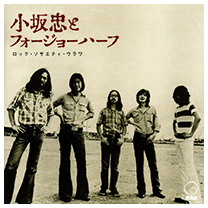 Four Joe Half "Urawa Rock Society 1972 Summer Camp" (Fuji Records, 2020) (LP)
Four Joe Half "Urawa Rock Society 1972 Summer Camp" (Fuji Records, 2020) (LP)
Recommended! This appears to be an archival live recording of the Japanese country-rock band Four Joe Half, which included lead singer Chu Kosaka, steel player Hiroki Komazawa and others, in a languid set that has a dreamy, Grateful Dead-meets-Burrito Brothers feel. The tempo is a little unvarying, and taken as a whole this album could get a little monotonous, although each individual track is pretty sweet. A strong entry into the historical Japanese 'Seventies country-rock canon... As far as I can tell this was a concert performance (possibly recorded as part of a Woodstock-like concert film) that sat in the vaults until several decades later. [Note: the "title" above is just something I slathered together using Google Translate... I welcome corrections, if they are required.]
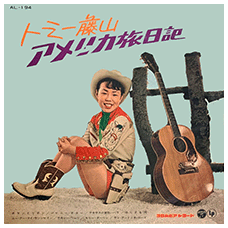 Tomi Fujiyama "America Tabinikki" (Columbia Records, 1960) (LP)
Tomi Fujiyama "America Tabinikki" (Columbia Records, 1960) (LP)
A Japanese-born country music fan, singer Tomi Fujiyama started out in the 1950s as a pop singer but "went country," and found a fan base while performing for American soldiers stationed in Japan. In the early 'Sixties she traveled to America, booking a lounge gig in Vegas that lasted nearly a year and a half and even opened some doors in Nashville. She was apparently a protege of songwriter Bill Anderson, who wrote the A-side of an American-issue single, "Lonely Together," which was released around the same time as her 1964 appearance on The Grand Ole Opry, where Anderson introduced her onstage. Flush with success, Fujiyama returned to Japan, and continued to build her career in USO tours, performing for American troops during the Vietnam War. She became possibly the best-known country singer in Japan, selling millions of records, and was the subject of a documentary film called Made In Japan, which recounts her career. (More information available on Tomi Fujiyama's website.)
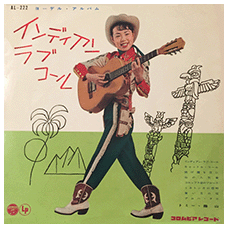 Tomi Fujiyama "Indian Love Call" (Columbia Records, 1960) (LP)
Tomi Fujiyama "Indian Love Call" (Columbia Records, 1960) (LP)
A second set of country covers, recorded as Fujiyama's career was taking off with numerous shows on American military bases. Most of the song titles are in Japanese, with "Indian Love Call" the English-language exception. No idea who was backing her up on these early recordings.
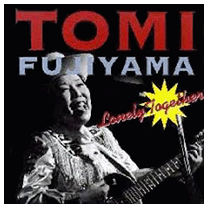 Tomi Fujiyama "Lonely Together" (Panam Records, 1996) (CD)
Tomi Fujiyama "Lonely Together" (Panam Records, 1996) (CD)
A sort of career retrospective, this CD isn't all country material, though it does include a Japanese-language remake of Bill Anderson's "Lonely Together," a version that actually hit the America charts back in '64. The Nashville backing band includes A-list session players such as Vassar Clements, Sonny Garrish, Charlie McCoy and guitar picker Biff Watson, as well as a guest appearance by Bill Anderson.
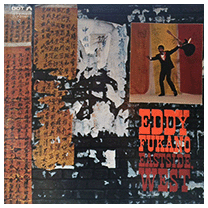 Eddy Fukano "Eastside, West" (Dot Records, 1968) (LP)
Eddy Fukano "Eastside, West" (Dot Records, 1968) (LP)
(Produced by Billy Vaughn)
Born and raised in Tokyo, singer-actor Eddy Fukano (1938-2018) cut a few folk-country recordings in Japan before heading East to build his career, making his American debut in Honolulu, then moving briefly to Los Angeles before booking various lounges gigs, mostly in the western US. He had made some records back in Japan, and landed a major-label contract in 1968, producing this album and a couple of singles for the Dot label. The discs were accompanied by a big publicity push, though he never quite broke through into the mainstream market. Mr. Fukano also made a cameo in the 1969 hicksploitation feature film, From Nashville With Music, and he seems to have made a few live performances on TV as well. He eventually settled down in Seattle, Washington where he made at least one single produced at Ripcord Studios, although I'm not sure how active his performing career was in later years.
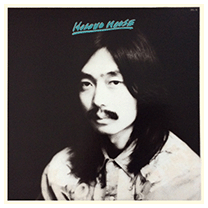 Haruomi Hosono "Hosono House" (King Records-Japan, 1973) (LP)
Haruomi Hosono "Hosono House" (King Records-Japan, 1973) (LP)
(Produced by Haruomi Hosono, Masaki Nomura & Kinji Yoshino)
This was the first solo album (I think) by Japanese pop chameleon Haruomi ("Harry") Hosono, a musician and producer best known as a co-founder of the late '70s/early '80s technopop band Yellow Magic Orchestra. Born in 1947, multi-instrumentalist Hosono had previously led the late 'Sixties psych band Apryl Fool, which transformed into the eclectic folk-rock/avant group Happy End. Happy End broke up in early 1973 after recording a few albums, and Hosono continued in that group's experimental direction on this album, which has an insouciant, puckish, almost Zappa-esque feel. I guess it's a stretch calling this a "country" record, though there are definitely some strong country vibes, largely courtesy of pedal steel player Hiroki Komazawa, who is showcased on a couple of tracks (including one where Hosono mumbles the phrase "country music" in English during the bridge... Also some gentle, folkish tunes, though most of the album is a little too rock-pop oriented for me, even with the kooky, oddball touches. The good tracks are quite good, though.
Yosui Inoue "Yosui Live" (Polydor Records, 1973) (LP)
(Produced by Katsuya Amuro)
Shintaro Ishida & The Citylites "Western Special II" (?)
Shintaro Ishida & The Citylites "Citylites" (?)
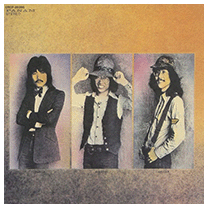 Kaguyahime "Kaguyahime 3" (Panam Records, 1973) (LP)
Kaguyahime "Kaguyahime 3" (Panam Records, 1973) (LP)
(Produced by Yutaka Goto, Ken-Ichi Matsuzawa & Tsuguo Sato)
Though considered more of a folk-rock band, the group called Kaguyahime definitely dipped into the waters of contemporary early 'Seventies country-rock, with light pleasant twang buoyed by fiddle, dobro and steel guitar. Sure, this is more in line with soft-rock bands such as America or The Little River Band... but it is that really such a bad thing? Though some of the arrangements can sound a little trite, overall this is a pretty pleasant album, and can also be appreciated by folks looking for some hippie-era Japanese folk-freak psychedelia. The band's main trio of guitarist Shozo Ise, singer Kosetsu Minami and bassist Panda Yamata are joined by a number of studio musicians, notably Takahiko Ishikawa on dobro and guitar, and Masahiro Takekawa playing violin... The group recorded several albums and seems to have been pretty popular, though I don't know how much twang may have been in their other albums; I know some of their later stuff (particularly their solo works) devolved into some pretty drab, slick pop. [Note: I have to apologize for making up the album title above: at least part of it was the band's name, but I couldn't find a translation of the rest of the text. But it does seem to have been their third album... So... close enough?]
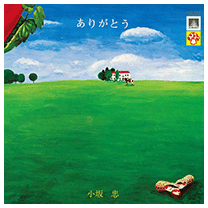 Chu Kosaka "Arigato" (Mushroom Records, 1971) (LP)
Chu Kosaka "Arigato" (Mushroom Records, 1971) (LP)
(Produced by Miki Curtis)
A lovely soft-rock album with strong country-rock leanings; apparently this was the first solo album from Chu Kosaka, aka Kosaka Masayuki (1948-2022) who had formerly been in the psychedelic rock band Apryl Fool with Haruomi Harono, who also (briefly) went in a pastoral, country-ish direction after that band broke up. Kosake plays several instruments on this album, including bass, guitar, and mandolin -- he's joined on the country side by banjo player Takashi Matsumoto, steel player Katsuo Ohno and fiddler Toshio Tanioka, as well as pianist Yumi Arai, who had kind of a Carole King/Carly Simon vibe.
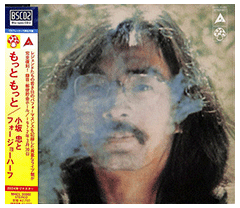 Chu Kosaka & Four Joe Half "Farther Longer/Motto Motto" (Denon Records, 1972) (LP)
Chu Kosaka & Four Joe Half "Farther Longer/Motto Motto" (Denon Records, 1972) (LP)
Highly recommended. Though officially billed as a solo album by singer Chu Kosaka, this was also the lone contemporary release by Four Joe Half, one of Japan's most accomplished and twangiest country-rock bands. This lineup also featured steel player Hiroki Komazawa, whose concise, evocative licks gave a clear definition to their sound, which had an overall Little Feat-like or Flying Burrito Brothers vibe. [As noted above, the original Japanese title is a repetition of the word "motto," which has multiple meanings -- you could translate this as "More, More," though I think "Farther Longer" has a nicer ring.]
![]() Kazuya Kosaka & The Wagon Masters "Japanese Farewell Song" (Columbia Records, 1956) (LP)
Kazuya Kosaka & The Wagon Masters "Japanese Farewell Song" (Columbia Records, 1956) (LP)
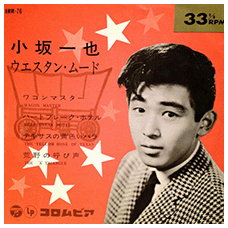 Kazuya Kosaka & His Wagon Masters "The Wagon Masters" (Columbia Records, 1968) (LP)
Kazuya Kosaka & His Wagon Masters "The Wagon Masters" (Columbia Records, 1968) (LP)
Film star Kazuya Kosaka was one of Japan's most influential and earliest champions of American-style country music, forming his band The Wagon Masters around 1954, and releasing a string of singles in the years that followed. Kosaka translated songs by Hank Williams, Marty Robbins and others into Japanese, and found common ground between American twang and the plangency of traditional Japanese music. This retrospective album gathered some of his best recordings from 1954-58, including a lot of compelling material. Although the rhythm elements are pretty minimal, there's some pretty decent steel guitar in the mix, and only a slight hint of musical exoticization; he also sings in English on some songs, and had a pretty solid accent, drifting into an almost Webb Pierce-like tonality. Recommended!
Kazuya Kosaka "Country My Way" (Green City Records, 19--?) (LP)
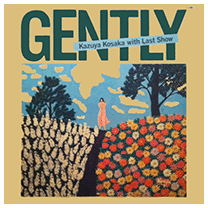 Kazuya Kosaka & Last Show "Gently" (Crown Records, 1983) (LP)
Kazuya Kosaka & Last Show "Gently" (Crown Records, 1983) (LP)
This appears to be Mr. Kosaka backed by a younger Japanese band, probably singing some of his own translated versions of classic country oldies. Alas, as yet I have no information about who were the members of the Last Show band.
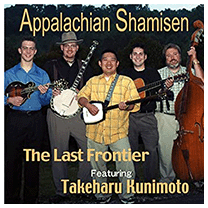 Takeharu Kunimoto & The Last Frontier "Appalachian Shamisen" (Now And Then Records, 2005) (CD)
Takeharu Kunimoto & The Last Frontier "Appalachian Shamisen" (Now And Then Records, 2005) (CD)
(Produced by Keith Smith)
A popular performer in Japan, Takeharu Kunimoto (1960-2015) was a master of the traditional lute-like three-string shamisen, which he adapted to take on a role similar to the banjo after he fell under the spell of Bill Monroe and the bluegrass genre. Wile still a teenager in the early 1970s, Kunimoto attended a Bill Monroe concert and was blown away, inspiring his love of the genre and his determination to combine it with his own interest in traditional folk instruments. In the early 2000s he enrolled in a country music program at East Tennessee State University, where he recorded this album and two others with a bluegrass band called The Last Frontier, which included several other students in his program. (Alas, I haven't ben able to find any information about the other two albums, though multiple sources assure us they exist...)
 The Lost City Cats "The Lost City Cats!!" (King Records-Japan, 1971) (LP)
The Lost City Cats "The Lost City Cats!!" (King Records-Japan, 1971) (LP)
A Japanese bluegrass band that visited the US in 1973, with fiddler Noboru Morishige joining the Stoneman family band on the road for most of 1973-74. This may have been their only album... Alas, the musician's names are only given in Japanese and the liner notes are written in Japanese on the back cover, although the song titles are translated into English, as well as on the label. Includes standards such as "Banks Of The Ohio," "Turkey In The Straw," and "How The Mountain Girls Can Love." Anyone know more about these folks?
The Lost City Mad Dogs "Kamikaze Bluegrass: Thirty Minutes Over Nashville" (Music Mountain Records, 1981) (LP)
A Japanese bluegrass band which made a couple of pilgrimages to the United States and take advantage of the resources offered in some authentic American studios. I've only seen their second album, so I don't know if the lineup is the same here, or if they had any American musicians playing with them... feel free to send me some photos if you own this one!
The Lost City Mad Dogs "Kamikaze Bluegrass 2: Waltz Across Texas" (Music Mountain Records, 1983) (LP)
(Produced by Slim Richey)
Nashville's fine, but if you really wanna get country, you gotta go to Texas... This set was recorded at Crystal Clear Sound in Dallas, Texas, the same independent studio where The Dixie Chicks and Nickel Creek cut their first demos, with local hero Slim Richey at the helm. The lineup included Mad Dog members Sumio Danno (banjo), Shinichi Maeda (fiddle), Yoshitaka Murata (bass), Masaya Narata (guitar) and Mamoru Okutani on mandolin, with extra backing by special guests including newgrass luminaries Alan Munde and Roland White, as well as a bunch of lesser-known pickers assembled by album producer Slim Richey (who also chimes in with a bit of electric guitar...)
![]() Mike Maki "Folk Album" (Philips Records, 1966) (LP)
Mike Maki "Folk Album" (Philips Records, 1966) (LP)
Sort of a jack of all trades, singer Mike Maki played in a pop group called the Mikes, in a country duo with a guy named Eddy Murata, and cut a string of 'Sixties folk records before subsuming himself back into the pop world in the 1970s and '80s. This low-key acoustic album isn't super-twangy and stays pretty strictly Greenwich Village adjacent, although it's more Polly-Wolly-Doodle-all-day than Dylan-went-electric.
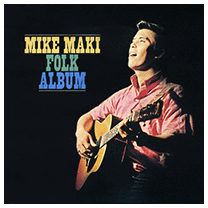 Mike Maki "Meet Mike Maki" (Philips Records, 1967) (LP)
Mike Maki "Meet Mike Maki" (Philips Records, 1967) (LP)
Although they recycled the album art, I believe this was a different album than the Folk Album above, although it may have been the same one repackaged for import. The cover proclaims this to be "Japanese Folk - Songs With A Smile (Sung In English)" and the credits list D. Percival as Maki's main collaborator, presumably helping to translate Japanese songs such as "The Crow And The Persimmon Seed" and "Beautiful Nippon" into English. Anyone know more about these albums?
![]() Mike Maki "One Man Band" (Polydor Records, 1978) (LP)
Mike Maki "One Man Band" (Polydor Records, 1978) (LP)
(Produced by Mike Maki)
A slightly more modern set, with material from the likes of Hoyt Axton ("Greenback Dollar"), Paul Clayton, Woodie Guthrie, Gordon Lightfoot, Pete Seeger and Randy Sparks. In keeping with the album title, Mike Maki plays banjo, bass, dobro and guitar, as well as harmonica, mandolin, washboard and kazoo. He meant business!
 Tokyo Matsu "The Country Lady From Japan" (BG/Scorpion Records, 1975-?) (LP)
Tokyo Matsu "The Country Lady From Japan" (BG/Scorpion Records, 1975-?) (LP)
Originally from Japan, Matsu Shockley (aka Tokyo Matsu) was a classically trained violinist who got hooked on country music, and first found an audience in the 1960s and early '70s performing for American servicemen in Europe and Asia, including USO tours in Vietnam. She emigrated to the United States and found work touring with various Nashville stars, as well as in regional "oprys" such as the Wheeling Jamboree. As with many fiddlers, one of her signature numbers is "Orange Blossom Special," where she showcases her improvisational skills and hot licks. Matsu eventually laid down roots in Nashville, with her husband George Shockley. (Note: there are at least two different editions of this album, one on Scorpion Records, and another on the BG label, which may have been Matsu's private souvenir label.)
 Tokyo Matsu "From Tokyo With Love" (Fifer Records, 1980) (LP)
Tokyo Matsu "From Tokyo With Love" (Fifer Records, 1980) (LP)
Another souvenir album with the inevitable run-throughs of "Diggy Liggy Lo," "Orange Blossom Special" and "Rocky Top," along with other fiddle tunes and country oldies. A little off the beaten track are "There Ain't Gonna Be No Another Time," "You're Mine Till I Die" and ""He's Already Gone To My Heart" which was released as a single on Scorpio Records. No musician or producer credits, although the single was produced by Slim Williamson.
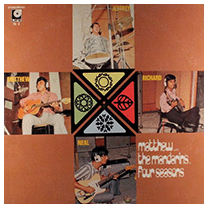 Matthew & The Mandarins "Four Seasons" (The Life Records, 1974) (LP)
Matthew & The Mandarins "Four Seasons" (The Life Records, 1974) (LP)
(Produced by Vincent Lim)
A convincing set of pretty-pure twang by a pioneering band from Singapore, led by singer-guitarist Matthew Tan, backed here by Neal Alexander (lead guitar), Richard Danker (bass and piano) and Jeffrey Goh (drums). They cover a slew of late '60s/early '70s classics, including several Merle Haggard tunes ("It's Not Love, But It's Not Bad," "Okie From Muskogee," "Silver Wings," and "Swinging Doors") along with chestnuts such as "Folsom Prison Blues," "Louisiana Man" and "My Son Calls Another Man Daddy." Tan's vocals are pretty strong, with a credible American accent that never really slips, although on some songs -- notably Kris Kristofferson's "Why Me, Lord" and "Is Anybody Going To San Antone" -- his phrasing is a little flat and he doesn't quite connect with the lyrics. For the most part, though, this is a strong presentation, reflecting the band's considerable experience as a working group. They started out in 1961, working in nightclubs as a pop group before gravitating towards country music; they also backed other artists, notably singer Anita Sarawak on her 1969 debut album, With A Lot O' Soul. This album isn't super-dynamic or arresting, but it's a lot more solid than you might expect.
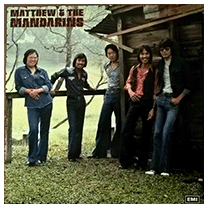 Matthew & The Mandarins "Matthew & The Mandarins" (EMI, 1978) (LP)
Matthew & The Mandarins "Matthew & The Mandarins" (EMI, 1978) (LP)
(Produced by Reggie Verghese & Vincent Lim)
Moving to Nashville from 1975-77, Matthew Tan delved even deeper into American country, soaking up the then-current countrypolitan sound, which is reflected in this album's centerpiece, "Singapore Cowboy," an autobiographical novelty number that became a big regional hit in the late '70s. You gotta love the lyrical pun, "sing a poor cowboy another lonely song." Nice.
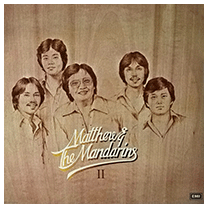 Matthew & The Mandarins "Matthew & The Mandarins II" (EMI, 1979) (LP)
Matthew & The Mandarins "Matthew & The Mandarins II" (EMI, 1979) (LP)
(Produced by Reggie Verghese & Vincent Lim)
A mix of country covers and originals... The songs written by Matthew Tan include "Leaving You Is Easier Than Wishing You Were Gone," "More Than Just A Memory," and the novelty number, "Let's Put The Sing In Singapore." Pop singer Tracy Huang guests on a version of Kris Kristofferson's "Stranger."
Katsuaki Miyazaki "Man-O-Mandolin" (Red Clay Records, 1996) (LP)
(Produced by Ronnie McCoury)
A bluegrass set from mandolin picker Katsuaki Miyazaki, recorded in Nashville but released in Japan. The studio crew included several American heavyweights such as David Grier, Alan O'Brien and producer Ronnie McCoury (Del's kid) who also chimes in on guitar and mandolin. Not a lot of info about this artist, though one suspects they had a more extensive career in Japan. (Thanks to PragueFrank for the tip on this one...)
Katsuaki Miyazaki "Mandoscape" (Red Clay Records, 2003) (LP)
(Produced by Katsuaki Miyazaki)
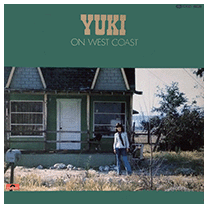 Yuki Miyamae "Yuki On West Coast" (Polydor Records, 1976) (LP)
Yuki Miyamae "Yuki On West Coast" (Polydor Records, 1976) (LP)
A pop and country star of the 1970s and early '80s, Yuki Miyamae (1947-2014) was the wife of fellow musician Tomohiko Harasawa, and the mother of pop singer Yuri Chika. This is a pretty solid country set, with a couple of real oldies -- "Cotton Fields," "I've Been Everywhere" -- aired up with more modern hits such as Jessi Colter's "I'm Not Lisa" and Tanya Tucker's "San Antonio Stroll." Most of these songs are associated with "girl singers," tunes like "Harper Valley PTA," "Jackson" and "Stand By Your Man..." Mostly I just wanna hear her sing "Jolene"!
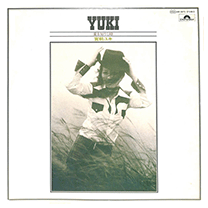 Yuki Miyamae "Yuki" (Polydor Records, 1976) (LP)
Yuki Miyamae "Yuki" (Polydor Records, 1976) (LP)
(Produced by Masashi Endo & Harasawa Tomohiko)
A mix of Japanese originals and covers of American country songs (thankfully rendered in Japanese, not English) such as her covers of "Delta Dawn" and "Me And Bobby McGee." Ms. Miyamae is backed by guitarist Chuei Yosekawa and the band Homemade, who are identified on the back cover.
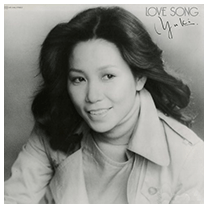 Yuki Miyamae "Love Song" (Polydor Records, 19--?) (LP)
Yuki Miyamae "Love Song" (Polydor Records, 19--?) (LP)
This LP is split evenly between country music and soft rock, with reprises of "Help Me Make It Through The Night" and "Jolene" as well as "Country Roads" and "Mule Skinner Blues." But if you also wanna hear her cover "I Write The Song," "Feelings," and "Torn Between Two Lovers," then this one's for you!
Ryoko Moriyama "College Folk Album" (Phillips Records, 1969) (LP)
Ryoko Moriyama "College Folk Album #2" (Phillips Records, 1969) (LP)
Though there are strains of the American folk scene that sift through this album, it's really more of a 'Sixties soft-pop/pop vocals kinda thing, with plenty of lavish, pastoral arrangements and whatnot. Speaking of the 'Sixties, this also seems a little late on the draw, missing the "college" folk scene by a few years. Ms. Moriyama was related to a few other musicians, including her father, jazz musician Hisashi Moriyama and her son, pop singer Naotaro Moriyama, who cut a few albums in the early 2000s.
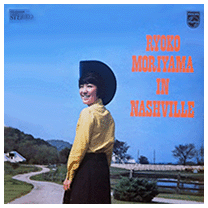 Ryoko Moriyama "In Nashville" (Phillips Records, 1970) (LP)
Ryoko Moriyama "In Nashville" (Phillips Records, 1970) (LP)
(Produced by Don Gant, Ronald Gant & Masaharu Honjo)
I'm not that familiar with Ryoko Moriyama's career, but I have heard one of her earlier folk albums, which was really more of a pop-vocals affair. In keeping with that style, this album includes more lightweight "folk" material, songs like "Black Is The Colour Of My True Love's Hair" and some Japanese folk tunes, though there are a couple of legitimate country oldies on here as well, Eddy Arnold's "Cattle Call" and "Green, Green Grass Of Home," and she really went all-out on her pilgrimage to Music City, booking time with an all-star A-list crew that included Jimmy Colvard, James Isbell, Charlie McCoy, Weldon Myrick, Hargus Robbins, Jerry Shook, and others. Beware the "country" record, though, that features multiple credits for harpsichord! Or bongo drums.
![]() Eddie Murata "Country And Western" (ELM Corporation/Million Record, 19--?) (LP)
Eddie Murata "Country And Western" (ELM Corporation/Million Record, 19--?) (LP)
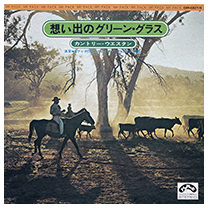 Eddie Murata & City Lights "Green Grass Of Memories" (My Pack Records, 197--?) (LP)
Eddie Murata & City Lights "Green Grass Of Memories" (My Pack Records, 197--?) (LP)
A cheapo country-covers album featuring singer Eddie Murata, who specialized in this kind of thing, as well as some folk music releases of similar calibre. The My Pack label was a short-lived 'Seventies imprint sponsored by the Daiei supermarket chain, which presumably sold the LPs in their stores; though this album is genuinely country (and thus of interest here) other My Pack releases I've seen were generally terrible easy listening pop, though each album had its own "theme." This is actually a pretty solid album: the City Lights band (whoever they were) were very professional, bright-sounding and quite tight. The only real down side is that Murata sings in English, and while his diction and accent are good, it would have been a lot more fun hearing these songs translated into Japanese. Oh, well.
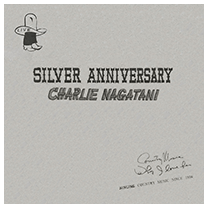 Charlie Nagatani "Silver Anniversary" (Kojima Recordings, Inc., 1981) (LP)
Charlie Nagatani "Silver Anniversary" (Kojima Recordings, Inc., 1981) (LP)
(Produced by S. Aoyama)
As the owner of Good Time Charlie nightclub and curator of the Country Gold Music Festival, Charlie Nagatani established himself as a tireless promoter of country music in Japan, hosting stars from Nashville while promoting the careers of countless of local artists. He started out playing American military bases back in 1956 while in Speedy Kido's band, and soon started his own group, The Cannonballs, in 1961, leading it for decades, including several trips to Nashville. This live album was recorded at Kumamoto Civic Hall in Nagatani's hometown on Kyushu island, where Nagatani settled down and opened his nightclub. This edition of the band included Mr. Nagatani on rhythm guitar and lead vocals, Kenny Awa (bass), Steve Noda (drums), Sumika Oda (vocals), Don Okayama (lead guitar), and Jim Yoshida playing pedal steel, and Kiyotake Kato adding fiddle and piano on several tracks. It's a pretty solid set of straight-up American-style country music, with plenty of Hank Williams, along with oldies by Johnny Horton, Buck Owens, Hank Thompson and others. Nagatani thanks several other country artists such as Yuki Miyamae, Yoshio Ono and Hank Sasaki, showing the depth of his support for the scene.
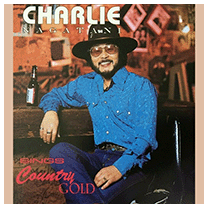 Charlie Nagatani "Sings Country Gold" (1992) (LP)
Charlie Nagatani "Sings Country Gold" (1992) (LP)
(Produced by Bruce Bouton & Michael Woody)
In 1989 Charlie Nagatani established the Country Gold Festival, which he hosted annually for the next three decades, adding a second, smaller festival a few years later. Nagatani also made regular pilgrimages to Nashville, playing the Opry numerous times and hanging out at Tootsies (where he's pictured on the cover of this album). Recorded in Music City, this set includes several high-profile guest performers: Emmylou Harris sings on "Wild Side Of Life," Bill Monroe drops in on the "Kentucky Waltz," the Osborne Brothers rollick their way through "Rocky Top," while Porter Wagoner sings harmony on "Truck Drivin' Man," demonstrating the range of Nagatani's musical interests and the calibre of his showbiz friendships. Also included is the autobiographical number, "My Name Is Good Time Charlie," co-written with Michael Woody, which later became the title of Nagatani's autobiography. Nagatani is one of the focal figures profiled in the documentary film, Far Western, which came out in 2021.
Yoshio Ohno "Memories Of My Mind" (1981)
Banjo player Yoshio Ohno (1931-2020) became a prominent country performer in the early 1950s, and like many Japanese country musicians played for American servicemen in Japan, Korea and the Philipines. In 1962 he formed his own group, the Countrymates, which toured widely with a lineup that changed over the course of several decades.
Yoshio Ohno "Peaceful Dreaming" (1984)
![]() Yoshio Ohno "To All The Girls I've Loved Before" (Denon Records, 1986)
Yoshio Ohno "To All The Girls I've Loved Before" (Denon Records, 1986)
Yoshio Ohno "All For The Love Of Sunshine" (Denon Records, 1990)
 Roanoke "The Swinging Bluegrass By Roanoke" (Side Vent Records, 1971) (LP)
Roanoke "The Swinging Bluegrass By Roanoke" (Side Vent Records, 1971) (LP)
(Produced by Junichi Yamada & Journey Sekiguchi)
Straight-up high lonesome bluegrass, recorded in Yokohama but released in America on an independent label in Virginia. The group included Y. Takahashi on guitar, Y. Sohma (banjo), M. Kotaki (mandolin), J. Yamamoto (fiddle), and H. Ohkawa on bass. Alas, no first names given.
Hank Sasaki "One Country" (2011) (CD)
One of the first Japanese country artists to gain fame in the postwar era, Masataka Sasaki (1937-2015) was a singer and songwriter who earned the nickname "Hank" while playing for American soldiers in the early 1950s, when his repertoire included a healthy dose of Hank Williams songs. A native of Fukuoka, Sasaki started out in a band called the Blue Rangers but quickly established himself as a solo performer, becoming one of Japan's most influential hillbilly musicians.
Hank Sasaki "Coming Home" (2014) (CD)
Hank Sasaki "Tennessee And You" (?) (CD)
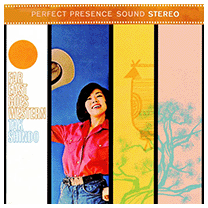 Tak Shindo "Far East Goes Western" (Mercury Records, 1962) (LP)
Tak Shindo "Far East Goes Western" (Mercury Records, 1962) (LP)
(Produced by Ed Yellin)
A pretty painful example of cultural (mis)appropriation... Or is it? Takeshi Shindo (1922-2002) was a California-born Japanese-American composer whose family was relocated from Los Angeles to the notorious Manzanar internment camp at the outbreak of World War Two. Shindo enlisted in the US Army and studied music during the war, returning to LA afterwards where he formed his own pop band and earned a music degree at USC, studying as a pupil of film composer Miklos Rozsa. Shindo delved into Japanese musical themes and became the go-to guy for Hollywood projects with an "Oriental" flavor and also got into the whole "exotica" craze of the late 1950s and early '60s. He landed a pretty plum gig as the music director for the TV show Gunsmoke and made several albums, including this country-themed easy listening marvel. It's really quite terrible, a set of famous western themes -- "High Noon," "I'm An Old Cowhand (From The Rio Grande)" and "San Antonio Rose" -- rendered unrecognizable from cluttered arrangements dominated by somewhat indiscriminate slatherings of koto and gongs. It's really quite odd. Deserving of mention in our country music survey, but a very different type of twang.
 Side Of The Road Gang "Side Of The Road Gang" (Capitol Records, 1976) (LP)
Side Of The Road Gang "Side Of The Road Gang" (Capitol Records, 1976) (LP)
(Produced by Mike Leech)
Although this major-label record always had the air of a prefab faux-outlaw product, the Side Of The Road Band were an actual working group from Dallas, Texas, led by songwriter David Patton. He's joined here by several other locals such as Billy Joe Howard and Radar Watkins, with a few studio pros such as fiddler Johnny Gimble brought in to fill out their sound. One notable bandmember was Hiroshi ("Mike") Ito, a Japanese-born multi-instrumentalist who had started out playing country and bluegrass up in Colorado, landed this gig for a few years, and then in 1979 started a decades-long tenure playing at the Baldknobbers "jamboree" mini-opry in Branson, Missouri. On their debut disc (and only one, as far as I know...) they covered some fairly hip outlaw-ish stuff like Michael Murphey's "What Am I Doin' Hangin' Round" and Guy Clark's "Broken Hearted People," as well as more questionable pop material such as David Gates's "Yours For Life." The Side Of The Road Gang apparently played local Texas shows at places such as Gilley's at least into the early 'Eighties, though info is surprisingly scarce online.
 Shoji Tabuchi "Country Music My Way" (ABC-Dot Records, 1975) (LP)
Shoji Tabuchi "Country Music My Way" (ABC-Dot Records, 1975) (LP)
(Produced by Grady Martin & Chip Young)
One of the best-known performers in Branson, Missouri, fiddler Shoji Tabuchi was born in Daishoji, Japan in 1944, and played in a nationally popular bluegrass band in the 1960s. He later emigrated to the United States to pursue his passion for American country music, finding success in the mainstream scene with help from showbiz elder Roy Acuff and others at the Grand Ole Opry. This album features backing from the cream of the crop of Nashville's studio session players, among them steel guitarists Lloyd Green and Weldon Myrick, bassist Henry Strzelecki, Bobby Thompson on banjo, drummer Kenny Malone, Jimmy Colvard playing guitar, and of course top fiddlers Johnny Gimble and Buddy Spicher playing in tandem with Tabuchi. It's a pretty impressive lineup, with a fairly muscular production style framing Tabuchi's fat-toned fiddling and admittedly iffy vocals. Interestingly enough, Tabuchi moved away from the Nashville scene, choosing instead the more independent country industry of the heartland.
 Shoji Tabuchi "Live At The Grapevine Opry" (Grapevine Opry Records, 1980) (LP)
Shoji Tabuchi "Live At The Grapevine Opry" (Grapevine Opry Records, 1980) (LP)
(Produced by Phil York)
Before moving to Branson, Missouri, Tabuchi joined the cast of the Grapevine Opry, a country variety show located on the outskirts of Dallas, Texas. There he was guided by the show's co-owners, singer Johnny High and manager Chisai Childs; when the Grapevine partners split up the show, Tabuchi followed Childs up north to Missouri, and like Childs, helped transform the Ozarks country scene from a series of smaller mom'n'pop operations into something slicker, more modernized and upscale, like Vegas but with a lot less sleaze. They both opened their own venues, with Tabuchi hosting the Shoji Tabuchi Show in his own 2000-seat auditorium. This album is a souvenir of his previous tenure in Texas, though it was recorded and released during a transitional period when Tabuchi was already gravitating towards Branson. The backing musicians were members of the Grapevine cast, including folks like Bud Carter (steel guitar), Dan Morris (lead guitar) and Joy Newman on piano... Lots of fiddle tunes and oldies, including standard fare such as a Hank Williams medley and, of course, a lively version of "Orange Blossom Special."
![]() Charlie Tagawa & The Junior Banjo Band "The Stars And Stripes Are Forever" (Charlie Tagawa Records, 1977) (LP)
Charlie Tagawa & The Junior Banjo Band "The Stars And Stripes Are Forever" (Charlie Tagawa Records, 1977) (LP)
(Produced by Charlie Tagawa)
This is the teenage subset of the Peninsula Banjo Band, a sprawling tangle of twang from San Jose, California, led by Zenso "Charlie" Tagawa (1935-2017) a banjo plunker born in Tokyo, Japan who studied under both Takashi Tsunoda and international star Harry Reser, later landing spots in several Japanese country and dixieland jazz bands during the 1950s and '60s. In 1964 he was "discovered" and offered a job in California by the owner of the Sakura Gardens restaurant in Mountain View, moving to America where he first found work playing in trad-jazz revival bands and later as the director of the Peninsula Banjo Band orchestra. The smaller-sized junior band was started in the early 'Seventies and became a more mobile organization that played at numerous competitions and civic events throughout California, as well as nationally and internationally. There is something inherently silly about banjo orchestra albums -- which can sound a lot like one big, undifferentiated, plangent drone -- but this smaller ensemble gave Tagawa a chance to come up with more varied arrangements, with a group of roughly twenty banjos, accentuated by stand-up bass, tuba, and (most delightfully) a tiny toy piano. I scanned the names of the kids in the band, and didn't spot any I knew, though Mr. Tagawa did teach several successful bluegrass musicians, notably Scotty Plummer, who recorded his own solo album in the early '70s.
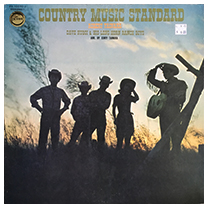 Robert Tainaka & Dave Kuboi "Country Music Standard" (Denon Records-Japan, 1970) (LP)
Robert Tainaka & Dave Kuboi "Country Music Standard" (Denon Records-Japan, 1970) (LP)
Guitar picker Robert Tainaka was a diehard enthusiast of American bluegrass music, dating back to the late 1950s and early '60s when he and his brother Jerry came to the United States as part of a cultural exchange tour, and made a point of seeing some of the great pickers of the time. He toured extensively and performed at American military bases and USO shows, and was instrumental in introducing Japanese audiences to bluegrass legends such as The Lilly Brothers and Del McCoury, organizing tours and producing albums of their music. On this album, Tainaka is backed by Dave Kuboi & His Long Horn Ranch Boys... Alas, while my copy includes English-language lyrics and song titles, the rest of the liner notes are all in Japanese, so no info about the musicians or the producers, other than a mention of Jerry Tainaka as the arranger. (There's a gal pictured in the band; unfortunately we don't see her holding an instrument, though I'd guess she plays fiddle. Although the Tainaka brothers were particularly into bluegrass, there are a lot of country songs on here, stuff like "Streets Of Laredo," "He'll Have To Go," and "High Noon," as well as classics from Hank Williams and Bob Wills.
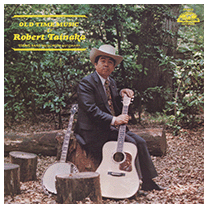 Robert Tainaka "Old Time Music" (Old Homestead Music, 1975) (LP)
Robert Tainaka "Old Time Music" (Old Homestead Music, 1975) (LP)
Mr. Tainaka continued to play American music, and cut this mid-'Seventies set on the venerable Old Homestead label, one of the great bluegrass/old-timey indies. The album features great liner notes by Everett Lilly, of the Lilly Brothers, who Tainaka helped introduce to Japanese fans. The ensemble featured Robert Tainaka on vocals and guitar, along with Kay Kawaguchi (guitar), K. Kohrikawa (autoharp and banjo), and fiddler Reiko Shirai... It's also worth noting that there were two gals in the band, a fine example of 1970s musical egalitarianism.
![]() Jimmy Tokita "Country Music" (King Records, 2005) (LP)
Jimmy Tokita "Country Music" (King Records, 2005) (LP)
![]() Jimmy Tokita "Country Hits" (King Records, ?) (LP)
Jimmy Tokita "Country Hits" (King Records, ?) (LP)
![]() Jimmy Tokita "Bluegrass Hits" (King Records, ?) (LP)
Jimmy Tokita "Bluegrass Hits" (King Records, ?) (LP)
Keijiro Yamashita "Kei-chan's Rock" (Toshiba Records, 1960) (10" LP)
Modestly vigorous American-style "rockabilly" from Tokyo-based singer Keijiro Yamashita (1939-2011) who apparently worked with Mickey Curtis and Masaaki Hirao in later years. He cut a string a singles from 1958-62 that were in a rock'n'roll/teenpop mode that were semi-cool, at least in comparison to the vast ocean of super-bland pop instrumentals and pop vocals recordings that surrounded them, but are still pretty wimpy by American standards. Later, of course, he mellowed and sang more mainstream stuff, though in the late 'Seventies he went back to his roots and records some oldies-oriented rockabilly albums.
Keijiro Yamashita "Share Otoko" (Toshiba Records, 1961) (10" LP)
Keijiro Yamashita "Golden '60s Collection: Greatest Hits" (Solid Records, 1987) (LP)
![]() Yuichi & The Hilltone Boys "When The Moon Shine Over Dumas" (Thousands Records, 2005) (CD)
Yuichi & The Hilltone Boys "When The Moon Shine Over Dumas" (Thousands Records, 2005) (CD)
 Yuichi & The Hilltone Boys "Yuichi & The Hilltone Boys" (El Toro Records, 2008) (CD)
Yuichi & The Hilltone Boys "Yuichi & The Hilltone Boys" (El Toro Records, 2008) (CD)
Rock solid retro-rockabilly from Japanese Elvis acolyte Yuichi Tatsumi, backed by a powerful, punchy band that nails the classic Sun Records sound. The backing band on this album includes bassist Osamu Inoshita, Yuji Itazu (drums), Yoshio Kobayashi (fiddle), Takao Kumamoto (pedal steel), Nobuhiro Nogayoshi (piano), Kenji Ohta (lead guitar and steel), and of course Mr. Tatsumi on rhythm guitar and lead vocals. This is a slightly expanded lineup of the band backing him on his other albums, with some tracks diverging into a more country direction that others. Pretty sizzling, overall -- love to see these guys on a bill with Big Sandy or Deke Dickerson!
![]() Yuichi & The Hilltone Boys "The Thousands Records Era: 2000-2005" (Thousands Records, 2008) (CD)
Yuichi & The Hilltone Boys "The Thousands Records Era: 2000-2005" (Thousands Records, 2008) (CD)
 Various Artists "THE KOREAN GRAND OLE OPRY: STATESIDE!" (Cho Hun Records, 1973-?) (LP)
Various Artists "THE KOREAN GRAND OLE OPRY: STATESIDE!" (Cho Hun Records, 1973-?) (LP)
(Produced by William Ludwig)
A genuinely odd record with a truly fascinating pedigree... Founded in 1964, the Korean Grand Ole Opry was a Seoul-based country band that played at NCO clubs and other venues frequented by American troops stationed in Korea during the Vietnam War era. It later became the house band for a country-themed bar with the same name. The Korean Grand Ole Opry is still located in a place nicknamed "Hooker Hill" in the Itaewon district of Seoul, South Korea, a neighborhood known for its blatant appeal to foreigners on the prowl for cheap booze and cheaper thrills... The bar's owner, Kim Sam-sook, aka Mama Kim, was once married to a guy from Texas and opened the Opry as a way to appeal to American servicemen and get them to spend more money in town, rather than on-base. Musically, this is surprisingly good, though the individual artists vary widely in their ability to "sound American," with the men sounding fairly twangy and the gals sounding a bit stiff and unsure of how to approach the music. Oh. And then there's the matter of their stage names, which are generally pretty offensive: there's the band's leader, Joe Ching Joe, along with Kimchi Chet Atkins, Rice Paddy Grandpa Jones, Miss Jenny and Kimchi Kitty and even -- yeesh -- a rockabilly picker they called Numb Nuts. I'm not kidding. Still, this is an amazing album, if even just from a socio-historical standpoint. It holds up musically as well, though, and apparently several of the performers wound up being successful Korean pop stars later on in the 1970s. So go figure. An interesting side-note is the album art: this same photo of waves crashing on a placid beach was used for several country(ish) records in the early '70s, although the label name seemed to change from client to client...

